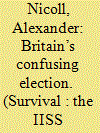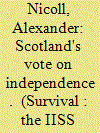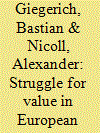|
|
|
Sort Order |
|
|
|
Items / Page
|
|
|
|
|
|
|
| Srl | Item |
| 1 |
ID:
138905


|
|
|
|
|
| Summary/Abstract |
Were it to be a straightforward ‘economy, stupid’ contest, the Conservative Party, led by Prime Minister David Cameron, might be expected to triumph in Britain’s 7 May 2015 general election. The government that took office in 2010, a coalition between the Conservatives and the third-placed Liberal Democrats, inherited a large budget deficit and a steep recession that had
begun with the 2008 financial crisis.
|
|
|
|
|
|
|
|
|
|
|
|
|
|
|
|
| 2 |
ID:
109888


|
|
|
| 3 |
ID:
130863


|
|
|
|
|
| Publication |
2014.
|
| Summary/Abstract |
A 'yes' vote, though unlikely, would fundamentally alter the British Isles, and potentially Europe as well. A routine parliamentary afternoon in the United Kingdom: under debate are final amendments to a bill designed to improve advice given to people in debt and to adjust the terms for those who fall into bankruptcy. A government minister, Fergus Ewing, speaks enthusiastically of a financial National Health Service. With matching spirit, his Labour Party opponent, Jenny Marra, attacks some measures as too harsh on bankrupt debtors. A division is called on her proposed amendments, and the number of members in the chamber quickly swells to more than 100 for the votes. The government wins them easily. However, in a remarkable display of consensus politics, the opposition parties, both Labour and the Conservatives, then support the bill, and it is duly passed.
|
|
|
|
|
|
|
|
|
|
|
|
|
|
|
|
| 4 |
ID:
141541


|
|
|
|
|
| Publication |
London, Routledge, 2015.
|
| Description |
432p.pbk
|
| Standard Number |
9781857437782
|
|
|
|
|
|
|
|
|
|
|
|
Copies: C:1/I:0,R:1,Q:0
Circulation
| Accession# | Call# | Current Location | Status | Policy | Location |
| 058339 | 355.40723/NIC 058339 | Main | On Shelf | Reference books | |
|
|
|
|
| 5 |
ID:
110299


|
|
|
|
|
| Publication |
2012.
|
| Summary/Abstract |
After decades of trying, Europe still does not get the best value out of the substantial amounts it spends on defence. The experience of the past 20 years suggests that European countries will continue to need to deploy forces in a wide range of operations for a wide range of tasks. Yet defence spending is in a decline that is unlikely to be reversed unless there is a major strategic shock. These two facts suggest that Europe's armed forces will be increasingly squeezed and forced to look for new solutions. They have been under pressure for some time to deliver more effective capabilities with smaller resources, but cuts in spending necessitated by budgetary austerity suggest that these pressures could become acute. European countries can still have strong, and more effective, militaries, but to do so they must make better use of their financial resources.
It is not a matter of falling in with the desperate demand of former US Secretary of Defense Robert Gates, who in 2011 joined the long line of US officials calling for a stronger effort from Europe. It is up to European countries, not the United States, to determine themselves what capabilities they need to deal with the threats they perceive. The present security situation offers plenty of uncertainties, such as those created by the Arab Awakening in Europe's neighbourhood, but no new direct and existential threats to the security of European countries. The diffuse nature of threats in an uncertain world has contributed to a general vagueness about the purpose of maintaining armed forces: defence-policy documents developed since the Balkan conflicts have tended to be laundry lists of potentially dangerous issues with little attempt to prioritise.
|
|
|
|
|
|
|
|
|
|
|
|
|
|
|
|
| 6 |
ID:
120495


|
|
|
|
|
| Publication |
2013.
|
| Summary/Abstract |
As prime minister, she touched nerves and affected lives. Even after 23 years, it is hard to achieve any kind of studied perspective on how she changed Britain.
|
|
|
|
|
|
|
|
|
|
|
|
|
|
|
|
|
|
|
|
|